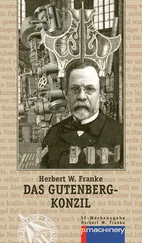The master’s insight had been simple: take a binder’s tool and make a mold. But he had seen that he could never make a punch for every single different letter of the scribal hand. So he had broken each one down into its elemental strokes: the straight descending line, the round form of the n , the o . Thus armed with a bare score of symbols, they could build each letter of the alphabet by layering each stroke in the damp sand.
It was a Calvary, as Gutenberg had said. But something in the blinding focus of it worked an alchemy in Peter nonetheless. His mind was stilled, the bitter chatter overwhelmed by the necessity of steadying his breath. Each stroke had to be placed at the same precise depth, or else the letters would come out uneven. Each tiny slip required him to start over, smoothing out the sand. He screwed his eyes in concentration, hearing nothing, seeing nothing but the motion of his hands. He shut the box and tipped the ladle — and in so doing, tipped and emptied out the roiling in his soul.
Early December 1450
THE FACT that Gutenberg could come and go as freely as he did was a clear proof of his high rank. He did not seem to worry that he’d be seized abroad as a debtor citizen of Mainz, as the merchants and guildsmen feared. Fust for his part paid dearly at each junction, his silver greasing countless palms to move his wagons out along the smaller, less-watched roads. If someone knew just where the master went, that someone would be Hans — but Hans, with a swift shake of his head, said only that he’d gone out prospecting. Which book the workshop cranked out next made little difference to Peter. Let Gutenberg and Fust decide; by then he would be off, once more a scribe for hire.
As it happened, the project was decided for them. The second week of Advent Lorenz arrived in haste, his old face pasty white, and thrust a letter at the master. Gutenberg set down the file he held, wiped his hands on his smeared apron, and examined the folded packet, which was heavy with official wax and seals.
“My appointment to His Majesty the King, no doubt,” he cracked and broke it open. They watched him read, the weather moving in swift bands across his face: first clouded mist, then squall, then sudden clearing as he dropped his hand and stared a moment, far away. His eyes met Hans’s. “Rosenberg,” was all he said; the foreman nodded. “I am to dance attendance up at Eltville. Somehow they’ve heard… or got their mitts on one of the first copies.” He spun, surveyed the rest of their poor crew; his eyes were knives that moved across each man.
“They”—the archbishop, plainly, and Hermann Rosenberg, his vicar general in spiritualibus . The vicar could not have heard from Heilant, surely — nothing Peter divulged could possibly have led to this. Nonetheless his hands were slick as he turned his face away and pressed the thin punch in the sand.
After Gutenberg had gone striding off, intent on making inquiries, the rest of them put down their tools and made a silent circle around Hans.
“What?” He scowled. “It’s not as if he tells me either.”
Even so, Hans did allow that the letter might have come from Gutenberg’s own business with the higher clergy; he’d been to see them more than once. Why, back in Strassburg he was friendly with the bishop, and of course his godfather had been Archbishop Dietrich’s close adviser years ago — though he was dead now, rest his soul. As for the rest, who knew what Rosenberg had seen or heard — you lot had best get back to work.
It took another day before the master’s plan emerged. He would take Peter, though God knew he’d never thought he’d need the cover of a scribe. He wasn’t sure exactly what the vicar general knew — how much or little of his new technique — but they would carry on as if they made what Gutenberg and Fust pretended. Knock out some pilgrim mirrors, he told Konrad and Hans — and as for you, boy, write me out a canticle or two to take to Dietrich in his country castle on the Rhine.
“Which ones?” asked Peter warily, uneasy at this turn.
“Whichever ones would go into a psalter for a pope,” the master snapped.
He must have looked astounded. Gutenberg just shook his head, his tufted eyebrows raised. “You do, I plan.” He cocked his chin at Hans. “I’ll take a printed sheet from the Donatus too, and five new mirrors if you’ve still got those blasted stamps.”
Hans laughed. “Don’t throw away a thing, now do I?” he said, and moved toward some shelves along the back. He reappeared with several dusty objects that on close inspection proved to be dies cast from some hard metal. These were used to stamp out mirrors for the pilgrims: shiny convex badges that, held up from far away, could capture holy rays that emanated from cherished relics like the finger bones of saints or shards of martyrs’ crosses. Or so the credulous believed.
The master scratched his face. They had a day to crank these things out; best not to keep the high and mighty waiting. He grinned as if delighted with himself. What was he playing at? Peter wondered. What did he have in mind, with one small printed sheet, a pilgrim mirror, and a page of written psalms?
His whole life Peter had never seen Archbishop Dietrich from any but the greatest distance. The prince elector was a jewel-encrusted miter at the far end of St. Martin’s nave, a golden blob that led some grand procession. So it was with a certain thrill that he found himself about to float into that august presence on the morning boat to Eltville-on-the-Rhine.
His father had not taken the news lightly. Suspicion pleated his broad face when he discovered that his partner — and his son — would bow and scrape before the archbishop. He bent his head and whispered urgently to Gutenberg, back turned so none could hear. It was not hard for Peter to divine his main concern. Too many people knew about the press — and worse, the very ones who knew were those who considered every man in Mainz their tool. Fust looked at Peter with acerbity and commanded him to be his ears and eyes. His son nodded, wadding up the pleasure that had opened in his heart. How lucky that he bore the name of Schoeffer and not Fust — for Dietrich surely knew the names of those on the city council who opposed him. How lucky, and how right, that Peter should be chosen and not Fust; he’d been a fool to think his father might be proud. For after all, his son would stand where Fust, for all his gold, could never dream of standing: face-to-face with the highest priest in the whole Reich, second only to the king that Dietrich, as last prince elector, chose with his deciding vote.
Peter’s feet had not even grazed the timbers of a boat since his return. The siren of the river whispered as he rose before first light and made his way down to the baths. The winter air was crystalline, though snow had yet to fall. He heard the bells of cloisters on the land, and up above him scudding clouds were sweeping up the stars. Each gate he passed showed a brief flash of dark gray water, teasing him with longing for the ride. He paid the maid who drew the bath a silver penny, twice the normal rate, and told her he’d take comfrey oil to match the greenness of her eyes.
He soaked and thanked the Lord that only crazy fools like him would think to bathe in utter dark. No other soul intruded on his calm, embroidered with the call of doves and the first footfalls in the lanes, until the maiden reappeared and lightly brushed her fingers at his neck. “A silver day,” she said, and Peter stiffened slightly, felt her hands begin to rub the tension from his arms and shoulders. An angel sent down to speed him on his way. He closed his eyes and gave himself up to the sweetness of her touch, like fishes nibbling at his limbs. He had to fight not to cry out, as she stroked harder, found and met his hardness in the silken water, moved and moved beneath the waves. The world went white, and it was long before he opened up his eyes. Froth lay upon the cooling water, and the green-eyed maiden was long gone.
Читать дальше












